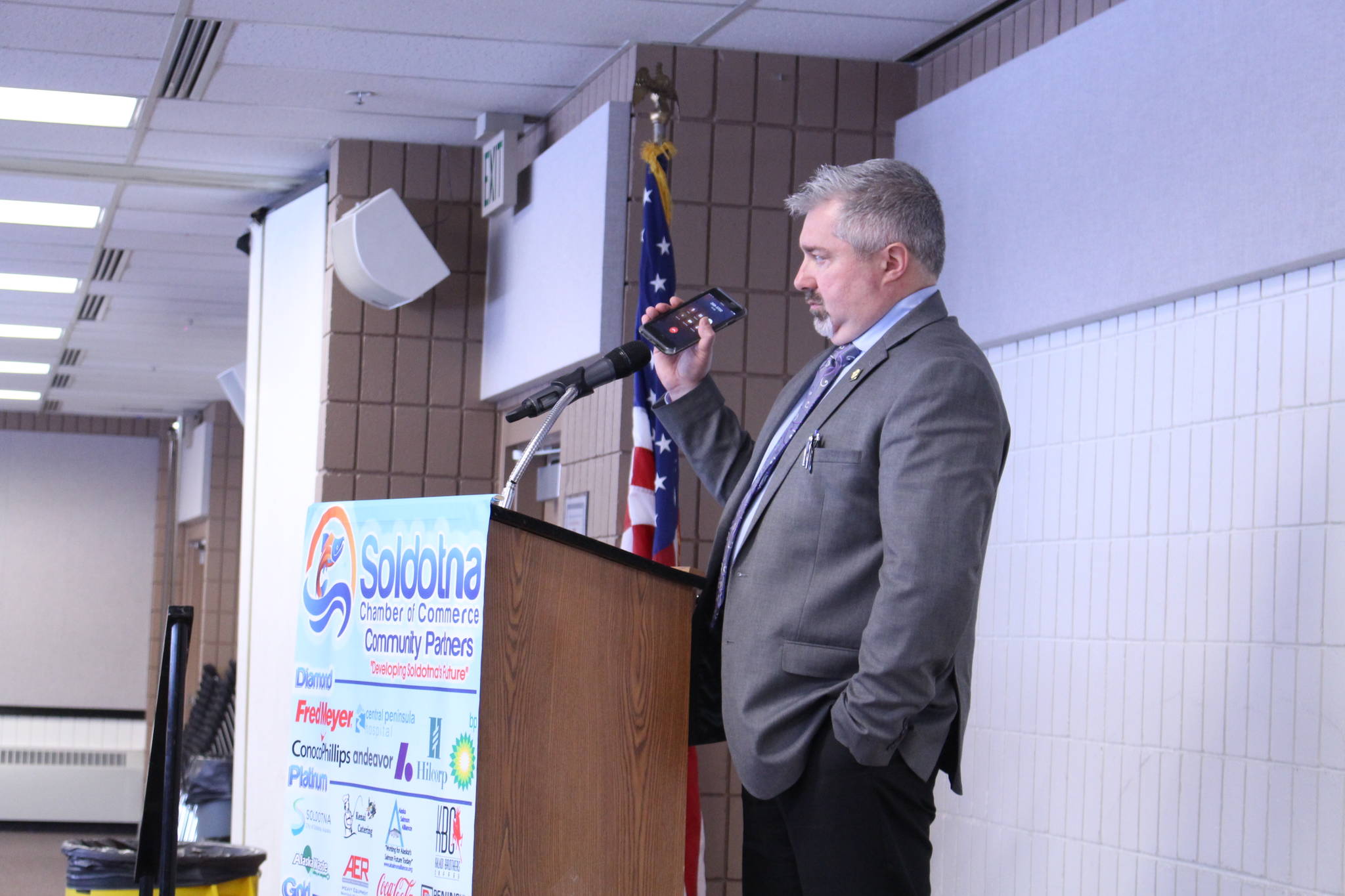Gov. Mike Dunleavy postponed his scheduled tour of the Kenai Peninsula this week in order to meet with public health officials in Anchorage and prepare for a potential outbreak of the coronavirus in Alaska.
Dunleavy was scheduled to host town halls in Kenai, Homer and Seward this week, starting with a town hall in Kenai Monday night, to discuss the state’s budget as well as long-term strategies for addressing Alaska’s fiscal situation. On Monday morning, Dunleavy announced in a press release that he would be postponing his trip to the peninsula “until such time as we can resume travel to communities,” and planned to communicate with Alaskans remotely and telephonically when possible.
Rather than appearing in front of the joint Kenai and Soldotna Chambers of Commerce for a luncheon Monday where he was scheduled to speak, Dunleavy instead spoke via his community outreach director’s cellphone, which was put on speaker and held up to the mic.
“First of all, I want to apologize to the chamber for not being there. Obviously we were looking forward to this trip,” Dunleavy said. “We ended up on a phone call with the vice president and his team that didn’t end until about 9:30 this morning dealing with the coronavirus, and then we had to deal with meetings after that to kind of work through some of those issues.”
While speaking to the chamber, Dunleavy attempted to alleviate any concerns around the spread of the coronavirus as well as issues tangentially related to the disease.
The U.S. State Department is advising against cruise ship travel on its website, which Dunleavy said has raised questions about what impact the virus will have on Alaska’s tourism industry. In addition, a drop in both the stock market and the price of oil over the weekend have had negative impacts on the state’s oil industry and the Alaska Permanent Fund.
Dunleavy told the chamber that Alaska’s cruise industry will see a minimal impact from the outbreak of the disease due to the fact that most cruise ships don’t arrive in Alaska until the summer. The state is also working with the cruise industry, Dunleavy said, to analyze their current health and safety precautions and to put measures in place to assess passengers’ health while they travel.
“We are fortunate that we have time to work through this and make sure that we have the best protocols in place. If for some reason the virus grows in intensity, you know, we will adjust accordingly at that point,” Dunleavy said. “The cruise industry situation in Alaska is a little different than what’s happening in the Caribbean, because we’re not scheduled to get these cruises until later in April.”
The price of oil, Dunleavy said, is largely outside of the state’s control, but he expects the current low prices to be temporary and added that Alaska’s crude oil industry will be impacted less than the fracking industries in the Lower 48.
“We have no indication that this price war between Russia and Saudi Arabia is going to drag out for quite some time,” Dunleavy said. “It certainly has the prospects of hurting the fracking industry, I think, quicker and more so than our long-term investment strategy that our oil players in Alaska have been using for some time. But nonetheless it concerns us, you know, for the short-term revenue picture and we’ll be having discussions with the Legislature on that.”
When it comes to the permanent fund, Dunleavy expressed his faith that the Alaska Permanent Fund Corporation is prepared to deal with occasional market fluctuations that, like the price of oil, are outside the state’s control.
“We have very good people in the permanent fund that are watching that very carefully and trading accordingly,” Dunleavy said. “So I would anticipate, although we may see a temporary dip in income, we’ve got people that are poised to make sure that when this turns around, and it can turn around any day, that we are poised to capitalize on that as well.”
As of Monday, out of 23 tests that have been administered, there are no confirmed cases in Alaska of COVID-19, a disease caused by the coronavirus that first appeared in Wuhan, China, in late 2019.
Alaska Department of Health and Social Services chief medical officer Dr. Anne Zink said during a press conference Monday that the state currently has the capability to perform over 500 additional tests and continues to “ramp up” the rate at which the tests are administered.
COVID-19 is a relative of the SARS and MERS viruses, which have caused outbreaks in the past. Symptoms for the disease include fever, runny nose, cough and breathing trouble. The elderly and those with weakened immune systems are particularly vulnerable to the disease. The CDC recommends that people avoid contact with others who are sick, avoid touching their face and stay home when they are sick. Face masks should be warn only by health care workers and people who are showing symptoms of the disease in order to prevent its spread.

